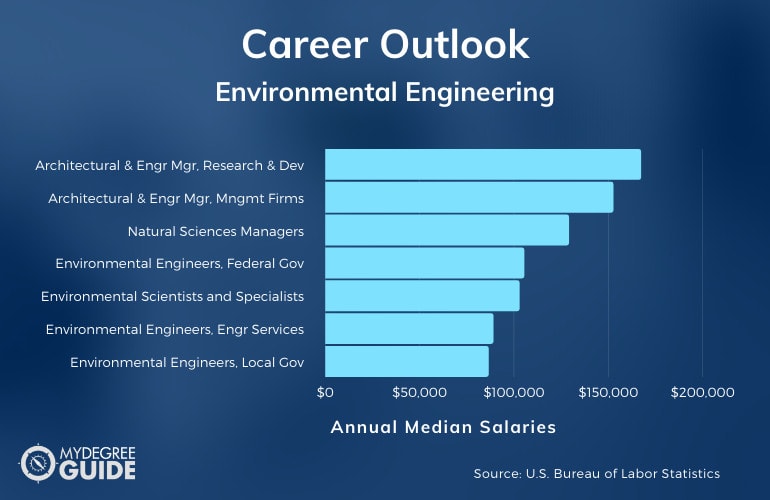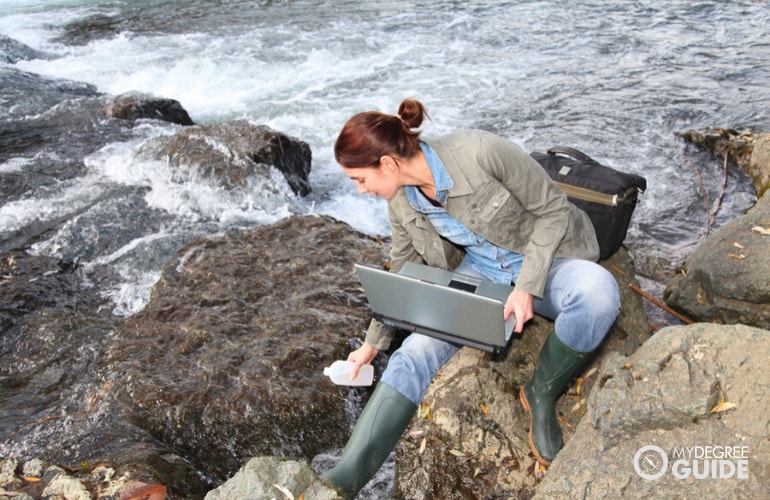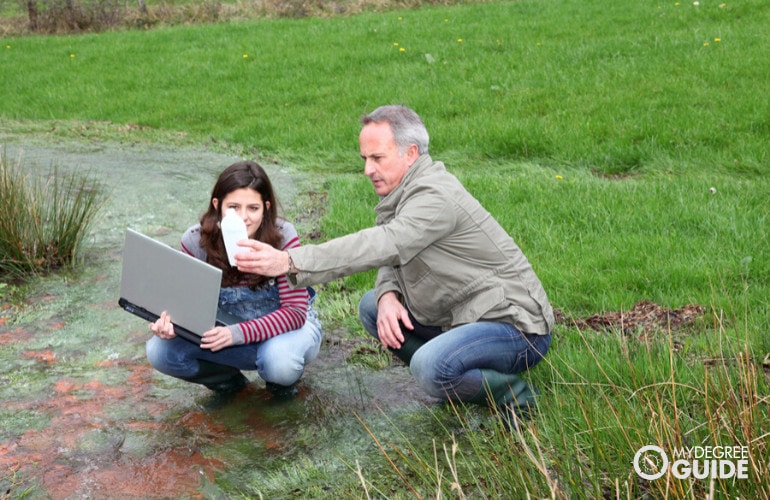If you’re passionate about the environment and have a keen interest in the quality of air, water, and soil, then you may consider earning an environmental engineering masters online.

Environmental engineering graduate programs are structured to provide an advanced understanding of environmental engineering concepts while ensuring that learning comes with valuable hands-on experiences.
Editorial Listing ShortCode:
Higher than average salaries and a positive job outlook help make environmental engineering a promising and rewarding field.
Environmental Engineering Masters Online Programs

Environmental engineering master’s programs focus on theories, applications, and methods used in the management and evaluation of water, soil, and air quality. These programs generally provide a blend of coursework that includes theoretical and knowledge-based learning in combination with hands-on lab work.
Earning a masters degree in environmental engineering can help qualify you for a number of different positions. Common careers in the field include environmental engineer, environmental scientist, and hydrologist.
Environmental engineers can be responsible for improving processes related to wastewater management, air pollution, recycling and disposal practices, and soil contamination.
To accomplish this, environmental engineers can design stricter environmental protection measures, evaluate the progress of environmental projects, and inspect facilities for compliance with regulations.
Editorial Listing ShortCode:
An advanced degree in this field can provide you with the educational foundation required to pursue roles in management. Some leadership roles include engineering manager, chief engineering officer, and natural sciences manager.
Teaching positions at community colleges may also be available to graduates with a master’s in environmental engineering.
The curriculum in online graduate programs in environmental engineering can pull from a variety of disciplines, such as civil and environmental engineering, environmental sciences, math, and mechanical and industrial engineering. This is similar to what you may experience in online masters in engineering management or online masters in civil engineering programs.
Specific courses studied as part of your degree may include environmental chemistry, hydrologic modeling, environmental biological processes, environmental fluid mechanics, waste management, environmental sampling and analysis, and climate science.
Other courses may cover engineering adaptation, air quality management, remote sensing of the environment, and dynamic modeling for investment and policymaking.
Environmental Engineering Careers & Salaries

Environmental engineers can work under a variety of occupational titles, including environmental consultant, water and sewer engineer, pollution control specialist, or public health engineer.
Completing an online masters in environmental engineering can help prepare you to work in various industries, including management firms, technical services, federal and state governments, research and scientific services, and NGOs and nonprofit organizations.
According to the Bureau of Labor Statistics, there are a number of positions that graduates can pursue with an online M.S. in Environmental Engineering.
| Careers | Annual Median Salaries |
| Architectural and Engineering Managers, Research and Development | $167,290 |
| Architectural and Engineering Managers, Management Firms | $152,640 |
| Natural Sciences Managers | $129,100 |
| Environmental Engineers, Federal Government | $105,410 |
| Environmental Scientists and Specialists, Federal Government | $102,910 |
| Environmental Engineers, Engineering Services | $89,050 |
| Environmental Engineers, Local Government | $86,540 |
| Environmental Engineers, Management, Scientific, and Technical Consulting Services | $84,300 |
| Hydrologists | $81,270 |
| Environmental Scientists and Specialists, Engineering Services | $73,410 |
Environmental engineer positions are expected to grow about as fast as average over the next several years, with a predicted growth rate of 3% for the profession (Bureau of Labor Statistics).
The Bureau of Labor Statistics expects some positions related to the field to grow faster than average, including hydrologists (5%), natural sciences managers (5%), and environmental scientists and specialists (8%).
Editorial Listing ShortCode:
Positive job growth in the field of environmental engineering is likely related to the government’s increased focus on efficiency regarding the use of water. In addition, businesses need to ensure their practices keep in line with environmental regulations.
Environmental Engineering Master’s Curriculum

When pursuing an MS in Environmental Engineering, you’ll typically take courses that cover topics in civil and environmental engineering, environmental sciences, math, and mechanical and industrial engineering.
- Environmental Chemistry: You’ll take a look at key principles of environmental chemistry and engineering, including water and air pollution, organic chemistry, acid-base reactions, and pH levels, among other topics.
- Hydrologic Modeling: This course is an overview of the hydrologic cycle, including precipitation, runoff, and snowmelt.
- Environmental Biological Processes: You’ll review microbiology and biological processes as they relate to applications in the field of environmental engineering.
- Environmental Fluid Mechanics: You’ll look at the behavior of fluids in both natural and built environments.
- Waste Management: This course is an overview of solid and hazardous waste management practices, including waste management alternatives and evaluation of existing systems.
- Environmental Sampling and Analysis: This course is an examination of theories, applications, and methods used in sampling and analyzing air, water, and soil for contaminants.
- Climate Science, Engineering Adaptation, and Policy: You’ll review evidence-based biogeochemistry, data science, and psychics as they relate to sustainability, resources, and renewable energy.
- Air Quality Management: You’ll study theories related to air quality management, including various methodologies for the analysis of pollutants and related systems.
- Remote Sensing of the Environment: This course is an overview of remote sensing practices and methodologies, including electromagnetic radiation, practices for using geographic information systems, and evaluation of satellite data.
- Dynamic Modeling for Investment and Policymaking: This course is a review of theories and practices related to environmental investment and policymaking, including decision making, risk management, and working with complexity.
Depending on the school and program you choose to attend, you may have the option to complement your coursework with either a master’s report or a master’s thesis.
Admissions Requirements

In order to qualify for admission to an environmental engineering master’s online degree program, you’ll be asked to fulfill certain requirements as part of the application process.
While these requirements can vary from one school to the next, common criteria include:
- On-campus or online bachelor of engineering degree and copies of transcripts
- Letters of reference from a former academic supervisor or professional colleague
- Statement of intent detailing your academic background and interest in the program
Additional criteria can include GRE or GMAT scores, but this requirement is becoming less common for admission to a number of programs.
Accreditation

Regional accreditation is a process that certifies the academic quality of a postsecondary institution. In order to become accredited, schools and their programs are required to meet a predetermined set of quality standards.
The accreditation status of a program can influence your ability to transfer credits and may impact your ability to enroll in PhD programs down the road. Accredited degrees are also generally received with higher regard by potential employers.
Editorial Listing ShortCode:
You can find out if the program you’re interested in attending is accredited by visiting the US Department of Education‘s website.
Financial Aid and Scholarships

There are a number of financial aid, scholarship, and alternative funding sources available to qualifying students that may help fund your masters degree in environmental engineering.
Federal and state governments offer grant and loan funding options while some private and public businesses provide the opportunity to apply and qualify for scholarships. In some cases, a scholarship may be geared towards specific areas of study or groups of individuals.
If you are currently employed, your employer may have an employee training or professional development program. In certain circumstances, you might be eligible to receive funding for your masters from these types of employer training programs.
You can find out more information on financial aid via the US Department of Education’s website, and you can also fill out the Free Application for Federal Student Aid (FAFSA).
How Long Does It Take to Get an Environmental Engineering Master’s Degree Online?

Traditionally, a masters in environmental engineering takes approximately 1 to 2 years to complete. Most programs require you to complete between 30 to 36 credit hours.
How long it takes you to complete your degree may depend on whether you attend on a full-time or part-time basis, the type of program you choose to attend, and whether you transfer previously completed credits into your program.
In some cases, programs can be completed in as little as 1 year. For part-time students, studies might stretch into 3 or 4 years.
What Can You Do with a Masters in Environmental Engineering?

A masters in environmental engineering can qualify you for a number of career opportunities. Professionals in this field can work as environmental engineers, environmental consultants, water and sewer engineers, hydrologists, and engineering managers.
You can pursue job opportunities in this field in a variety of settings, including environmental consulting firms, wastewater treatment plants, research centers or labs, and government facilities.
Some graduates even have the chance to work at a community college or operate their own consulting business.
What Is the Difference Between Civil Engineering vs. Environmental Engineering?

Environmental engineering focuses on various elements of the environment, including soil, water, and air quality.
Civil engineering, on the other hand, is a specialty that looks at the design and development of structures, such as buildings, bridges, roadways, and airports. Topics in civil engineering include the behavior of materials, transportation and construction engineering, structural engineering, and geotechnical engineering.
Editorial Listing ShortCode:
Professionals in the field of civil engineering can work on initial designs or repair plans for the development of various structures, and they may also oversee and manage the project until completion.
What Is the Difference Between Environmental Science vs. Environmental Engineering?

While there are some similarities between environmental science and environmental engineering, there are a few key differences.
Environmental science tends to have a stronger focus on the collection and analysis of data and research through samples and surveys. Environmental engineering, in contrast, places greater emphasis on using engineering principles to develop plans and practices for the protection of the environment.
Engineers generally use the information and research gathered by scientists to inform their decision-making.
Is a Masters in Environmental Engineering Worth It?

Yes, a masters in environmental engineering is worth it for many students. Environmental engineering grad programs can help prepare you for various positions that offer a positive job outlook over the next several years.
The Bureau of Labor Statistics predicts positive job growth for many careers in this field, including environmental engineers (3%), hydrologists (5%), natural sciences managers (5%), and environmental scientists and specialists (8%).
Generally, those with a masters degree are more favorable candidates for environmental engineering positions, according to the Bureau of Labor Statistics.
Universities Offering Online Masters in Environmental Engineering Degree Programs
Methodology: The following school list is in alphabetical order. To be included, a college or university must be regionally accredited and offer environmental engineering degree programs online or in a hybrid format.

California State University—Fullerton offers an online Master of Science in Environmental Engineering.
The program requires the completion of a team-based capstone project and can typically be completed in 2 years. Applicants must have a bachelor’s degree in any field. Those who studied engineering need a GPA of 2.5, while those who studied any other subject need a GPA of 3.0.
California State University – Fullerton is accredited by the Western Association of Schools and Colleges Senior College and University Commission.

Columbia University offers a Master of Science in Earth and Environmental Engineering. The program requires 30 credit hours, which can be completed online.
Students must maintain a GPA of 2.5 and complete all requirements within 5 years of starting the program. Applicants must have a GPA of 3.0, 3 letters of recommendation, and a resume.
Columbia is accredited by the Middle States Commission on Higher Education.

John Hopkins University offers a Master of Science in Environmental Engineering. Applicants must have a minimum GPA of 3.0 to be eligible.
The program allows students to select one of 3 areas of study: Environmental Engineering, Environmental Engineering and Science, or Environmental Planning and Management. Students must complete 10 credits within 5 years.
The Johns Hopkins University is accredited by the Middle States Commission on Higher Education.

Missouri University of Science and Technology offers a Master of Science in Environmental Engineering. Students may also choose to earn graduate certificates in either Geoenvironmental Engineering or Mine Reclamation. Applicants must have a bachelor’s degree in engineering with a GPA of 3.0 or higher.
Missouri University of Science and Technology is accredited by the Higher Learning Commission.

North Carolina State University offers an online Master of Environmental Engineering. Students must complete 30 credit hours with a GPA of 3.0 or higher. Those interested in the program must have an overall GPA of 3.0. Applicants who have a bachelor’s degree in engineering may have the GRE requirement waived.
North Carolina State University is accredited by the Southern Association of Colleges and Schools Commission on Colleges.

Old Dominion University offers a Master of Science in Environmental Engineering. The program can be completed online or on campus and requires 30 credit hours to graduate. Students may choose a thesis path or a project path. Applicants must have a GPA of 3.0 or higher and GRE scores.
Old Dominion University is accredited by the Southern Association of Colleges and Schools Commission on Colleges.

The University of California—Los Angeles offers a Master of Science in Engineering with a Certificate of Specialization in Sustainable Water Engineering. Students must complete 9 courses and either a capstone project or 3 written exams. Applicants must have a GPA of 3.0 and GRE scores.
UCLA is accredited by the WASC Senior College and University Commission.

The University of Florida offers a Master’s in Environmental Engineering Science. The program requires students to complete 30 credit hours, including 15 elective hours. A GPA of 3.0 or higher must be maintained to graduate. Applicants must have a GPA of 3.0, official transcripts, 3 letters of recommendation, and a statement of purpose.
The University of Florida is accredited by the Southern Association of Colleges and Schools Commission on Colleges.

The University of Illinois—Urbana Champaign offers an online Master of Science in Environmental Engineering. To graduate, students must complete 36 credit hours, with 8 of those hours coming from 500-level courses. Applicants must have a GPA of 3.0 or higher, GRE scores, 3 letters of recommendation, and a statement of purpose.
The University of Illinois at Urbana-Champaign is accredited by the Higher Learning Commission.

Worcester Polytechnic Institute offers a Master’s in Environmental Engineering. Students must complete 11 courses either online or on campus. The thesis option is only open to on-campus students. Applicants must have a bachelor’s degree in engineering with courses in fluid mechanics and twelve 3-credit math and science courses.
WPI is accredited by the New England Commission of Higher Education.
Getting Your Environmental Engineering Master’s Online

Earning your environmental engineering master’s online may provide you with the opportunity to advance in a rewarding and science-based career.
Career paths in this field that graduates can pursue range from environmental engineer and hydrologist to community college teacher, chief engineering officer, and engineering manager.
In addition to versatile career options, a masters in environmental engineering can help open the door to diverse work environments, including academia, fieldwork, lab work, and office work.
If you’re interested in advancing your career in this field, you may want to explore accredited online masters programs in environmental engineering to find the program that best fits your schedule and professional goals.

